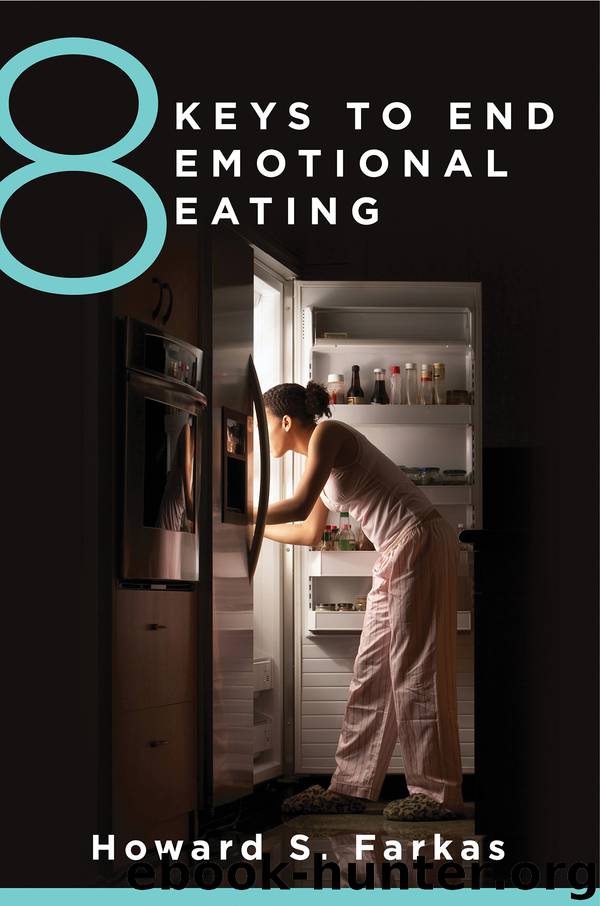8 Keys to End Emotional Eating (8 Keys to Mental Health) by Howard Farkas

Author:Howard Farkas
Language: eng
Format: epub
Tags: Epub3
Publisher: W. W. Norton & Company
Laissez les bons temps rouler!
When the demands of dieting combine with other sources of control, whether they’re strains in personal relationships or crisis situations at work, the cumulative effect can trigger episodes of emotional eating. You may wonder how eating helps someone cope with all those other sources of control. After all, eating seems like an overly specific response that’s unrelated to something like work or relationship stress. If you imagine trying to lift a large bucket loaded with many different heavy items, the strain of carrying it is caused by the overall weight, not by the type of items it contains. Being on a diet is only one layer in that bucket of demands, although a considerable one that you have to confront repeatedly each day.
Having to cope with all those different stressors can make you feel increasingly limited by forces beyond your control, and eventually the stress surpasses some personal threshold of what you can tolerate. Dieting may be only one of those stressors, but it’s one whose rules and limitations may be violated in complete privacy, minimizing, at least temporarily, the inevitable sense of shame. Rebelling against that source of control makes the whole bucket lighter and a lot easier to carry around. That’s one reason that emotional eating is so hard to stop.
The fact that different sources of stress can combine to reach that threshold of feeling controlled may account for why people attribute their emotional eating to such a wide range of causes. Since those other stressors are easy to identify as external causes, they also seem to be more plausible triggers of emotional eating than something like dieting, which seems to be more internally motivated.
When people break the rules, they feel they’re taking back control. Ironically, most people experience breaking the diet rules as losing control, rather than taking it back. This is understandable, since all they’re really aware of is a very helpless feeling, like driving on ice and going into an uncontrollable skid. You quickly realize that steering is useless, and all you can do is just wait until the car stops and hope for the best. As one patient told me, “When I decide to binge, it feels like I’m getting into a roller coaster just before it starts, thinking I don’t want to do this. But once I’m locked in I just give up and go along for the ride.”
Before I make the case that there’s a basic human tendency to push back against control, I’ll pose a challenge. Question: Aside from general drunken revelry and dissolute behavior, what do spring break, Mardi Gras, the twenty-first birthday bar crawl, and the bachelor party all have in common? Answer: Each is a type of ritual that marks either the start or conclusion of some type of limitation on people’s freedom.
For many college students, spring break is more than just a chance to relax in the sun over vacation; it’s a chance to let go of self-restraint and celebrate relief from the pressures of exams and papers.
Download
This site does not store any files on its server. We only index and link to content provided by other sites. Please contact the content providers to delete copyright contents if any and email us, we'll remove relevant links or contents immediately.
Binge by Oakley Tyler(911)
Unbearable Lightness by de Rossi Portia(802)
You Can Drop It! by Ilana Muhlstein(756)
Eating Disorders by B. Timothy Walsh(743)
Warrior by Theresa Larson(730)
This Is Big by Marisa Meltzer(665)
Acceptance and Commitment Therapy for Eating Disorders by Emily Sandoz(599)
Unbearable Lightness, A Story of Loss and Gain by Portia De Rossi(530)
Your Body, Your Best Friend by Erica Mather(517)
Beauty Begins by Chris Shook(512)
The Ministry of Thin - How the Pursuit of Perfection Got Out of Control by Emma Woolf(505)
The Happy Hoofer by Celia Imrie(492)
Diet Recovery: Restoring Hormonal Health, Metabolism, Mood, and Your Relationship with Food (Diet Recovery Series Book 1) by Matt Stone(490)
Unbearable Lightness: A Story of Loss and Gain by Portia de Rossi(485)
DR. SEBI ALKALINE RECIPE: A Complete Guide On Dr. Sebi’s Alkaline Electric Recipes Using The Sebian Food List And Ingredients by Carin C. Hendry(480)
Full-Filled by Renée Stephens(466)
Trauma-Informed Approaches to Eating Disorders by Andrew Seubert(448)
Fat, Pretty, and Soon to be Old by Kimberly Dark(432)
8 Keys to End Emotional Eating (8 Keys to Mental Health) by Howard Farkas(423)
